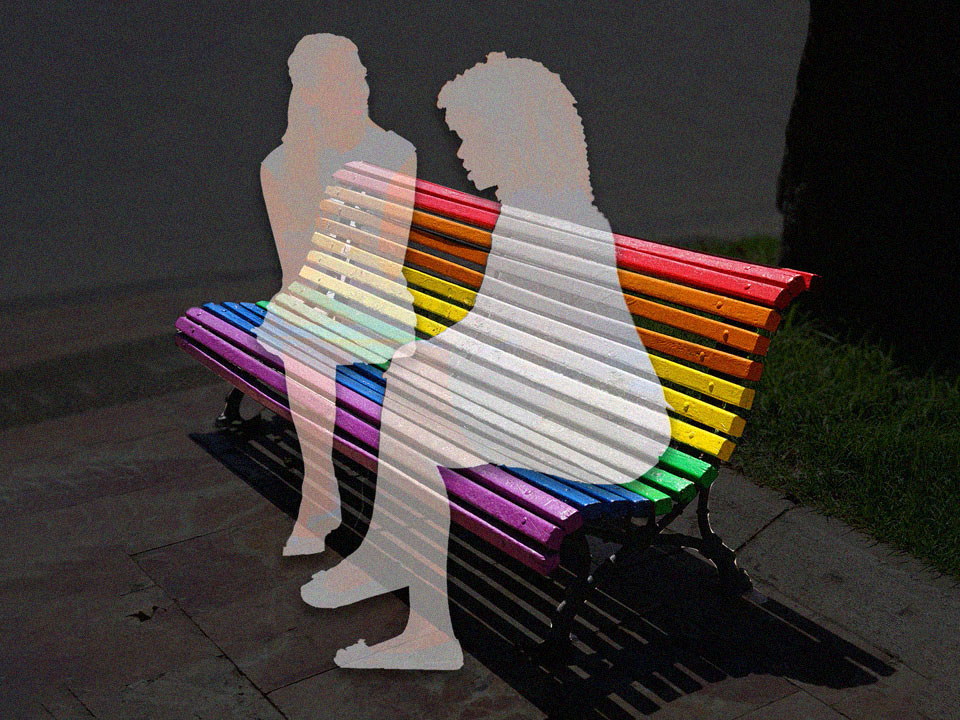8 Ways to Be There for Someone Who Came Out Later In Life
“The best thing we can receive is love, support, and the security of knowing things haven't changed.”
When someone you care about comes out as LGBTQ+, you might have a lot of feelings—especially when you’ve known them as a certain sexuality or gender for a long time. Even when the news that they’re not straight or cisgender is no big deal, you might still have questions. When did they know? Why didn’t they come out to you sooner? Do you need to adjust your language and behavior? How can you be there for them and not be totally weird about it?
Because everyone’s wants and needs are so different, there aren’t always straight answers (ba dum tss) to these questions. But there are still some solid ways to show your loved one extra understanding, reassurance, and love after they come out. To give you a better idea of what support can look like, we asked people who have been through this journey to share what they wished the people in their lives did (and didn’t do). Here are a few places to start.
1. First up, ask how you can be there for them.
"I came out as nonbinary using they/them pronouns shortly after I turned 32. I don’t know if it’s just me, but I think it’s imperative to ask questions if you’re comfortable and close with the person. If you can ask them how they feel safe and carry that out, it is a huge relief. This isn’t to say be overly cautious to the point of being patronizing or shielding a loved one. But rather it’s important to check in on how a loved one feels safe, especially as they’re in this new vulnerable place because the world outside of close loved ones can feel additionally draining, dismissive, and antagonistic." —Evan W., 32
2. If they’re pumped, be pumped with them.
"I came out right after my 28th birthday. My dad died suddenly a few months earlier and I was just like, I need to change my life. Now! My friends supported me by listening to me talk through it—a lot of ‘Am I bi or lesbian?'—and just accepting it. My mom struggled and that bummed me out, but my friends made up for that. Everyone was so excited when I met my girlfriend and couldn’t wait to meet her, too. It made me feel really loved." —Katie M., 30
3. Listen without judgment.
"My coming out as bisexual happened over several years in my late 20s and early 30s. First, I came out to my romantic partners with mixed results. Some were very kind and accepting, others fetishized it, and others dismissed it entirely. One partner said I was 'half gay', which felt really othering and like they didn't see me for who I was. I then came out to friends and family, who were both very positive overall.
“The best way people supported me was by seeing me fully, putting aside how they imagined they saw me or what they thought, and just listening to what I was saying and offering their support. Your main job is to listen and offer support and reassurance when it's needed. Coming out is about us fully sharing who we are, and the best thing we can receive is love, support, and the security of knowing things haven't changed." —Trevor L., 32
4. Don’t question their truth.
"I came out first as demisexual, or on the asexual spectrum, then as nonbinary in my early 40s. Then, a few years ago, I came out as two-spirit, as I’m also a person of Indigenous descent. My friends supported me for the most part. Family was a mixed bag but they didn’t say much about it. If someone tells you that they’re queer, trans, or nonbinary, believe them. Be honest but respectful, love them, and ask them what they need from you. Listen to them!" —Maya G., 50
5. Process your feelings privately.
“I came out at the age of 28 after being in a relationship with a woman for 6 years. My parents appeared supportive at first, but my mom told my dad that she was worried about what I would get up to. He told me everything she told him, so I knew she was having a hard time coming to terms with it. Eventually, my mom and I were able to have a proper adult conversation about my struggles, and she understood my perspective and I understood hers. I still have a close and loving relationship with her. I do wish she had a better initial reaction. Don’t make it about yourself. At the end of the day, the person coming out to you is revealing a part of themselves they kept hidden for a reason and your love and support is what they need to get through the emotional rollercoaster of coming out late in life." —Ryan G., 32
6. Don’t sweat the small slip-ups.
"I figured out that I was queer when I went to university and was finally exposed to the idea that it wasn't a bad thing. It took until I was 32 to find out I was trans. My friends were very accepting and supported me immediately—probably because I had cultivated friendships with queer-positive people. They all switched to my new name very quickly, and I spent more time reassuring them that the occasional slip-up was not a problem than correcting them.” —Charlotte M., 34
7. Treat them how you normally would.
"I came out when I was 32, shortly after divorcing my husband. We remained friends and I was nervous to come out as I didn't want people to think any differently about him. For those looking to support loved ones who come out later in life, treat them the same as before. Check in with them and ask questions as you normally would. When I came out to my friends in New York, it was tough because I wasn't sure how to start the conversation. Thankfully, I had a supportive group of girlfriends in the city. My advice is simple: Don't treat them differently, be curious, and keep an open mind. We're already nervous about telling you, so your support means everything." —Cathryn L., 37
8. Stand up for them, even when it’s hard.
"I didn't come out but I was forcibly outed by my mother at 24. My immediate family supported her, and horrible things were said about me and to me. She tried to get my aunt (her sister) and my grandma (her mother) to join. But both refused, to my surprise. I remember my aunt and her daughter sitting me down and telling me they accept and love me no matter what. My aunt told me that sometimes our parents just can't be who we want them to be. Sometimes our parents fail us. It was a horrible thing to come to terms with, but in the end, it was essential to my growth and healing. I think the best support is unapologetic. It's easy to support someone when nothing is opposing them, but when you stand in the face of your own loved ones to support the queer people in your life, it means even more." —Savanah L., 29
Wondermind does not provide medical advice, diagnosis, or treatment. Any information published on this website or by this brand is not intended as a replacement for medical advice. Always consult a qualified health or mental health professional with any questions or concerns about your mental health.




